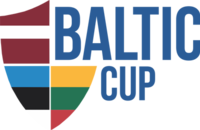Baltic Cup (football)
 | |
| Founded | 1928 |
|---|---|
| Region | Baltic (UEFA) |
| Number of teams | 3 (+ possible guests) |
| Current champions | (13th title) |
| Most successful team(s) | (13 titles) |
The Baltic Cup (Estonian: Balti turniir, Latvian: Baltijas kauss, Lithuanian: Baltijos taurė) is an international football competition contested by the national teams of the Baltic states – Estonia, Latvia and Lithuania. Also Finland has participated as a guest twice. Though originally held annually the competition has been biennial since 2008, running on even-numbered years. It is one of the oldest football tournaments for national teams in Europe after the British Home Championship, and the oldest one still organized.[1]
History
As Estonia had unofficially declared itself the Baltic football champion in 1925, 1926 and 1927 based on matches played with Finland, Latvia, Lithuania and Poland it was decided in 1928 to organize an official tournament. Though Poland and Finland were invited to join the tournament took place between the three Baltic nations.[2]
The tournament was intended to improve relations between the nations, but intrigues around the organization and budget questions worked against this noble goal. The hosts always did everything to wear out their competitors. In 1933 Lithuanian hosts surprised the officials with a tour to local brewery in the morning before Lithuania–Latvia match. Estonian newspaper Päevaleht reported that the Finnish referee for the match was really jolly, but did horrible job, mostly favouring Lithuanian hosts. The rules demanded that at least two wins were necessary to win the championship. Both Lithuania–Estonia and Lithuania–Latvia matches had been drawn but stopped due to darkness. In the team meeting Latvia demanded that Lithuania–Estonia match should be re-played first. Latvia was hoping for an advantage against tired Lithuanian team in their match. Lithuania and Estonia disagreed noting that Latvia had won their match against Estonia, so Latvian win against Lithuania would grant Latvians the championship and end the tournament. Consensus was not reached and Latvian team left the same day. The championship was not awarded.[2][3]
The feud led to the cancellation of the 1934 tournament, but the championship returned for 1935. Rules were changed so extra matches were now only held between leading teams if deciding champion.[4]
Results
Medal summary
- As of 2018.[6]
| Rank | Nation | Gold | Silver | Bronze | Total |
|---|---|---|---|---|---|
| 1 | 13 | 12 | 1 | 26 | |
| 2 | 10 | 7 | 8 | 25 | |
| 3 | 3 | 6 | 15 | 24 | |
| 4 | 0 | 1 | 1 | 2 | |
| Totals (4 entries) | 26 | 26 | 25 | 77 | |
Statistics
- As of 2018. Including the 1933 tournament, but excluding the reply match played on 5 September 1933.
| Rank | Team | Apps | Pld | W | D | L | GF | GA | GD | Pts |
|---|---|---|---|---|---|---|---|---|---|---|
| 1 | 27 | 53 | 28 | 18 | 7 | 85 | 45 | +40 | 102 | |
| 2 | 27 | 53 | 19 | 12 | 22 | 75 | 88 | −13 | 69 | |
| 3 | 26 | 52 | 10 | 13 | 29 | 54 | 83 | −29 | 43 | |
| 4 | 2 | 4 | 2 | 1 | 1 | 5 | 3 | +2 | 7 |
See also
- Under-21 Baltic Cup
- Under-19 Baltic Cup
- Under-17 Baltic Cup
- Baltic Futsal Cup
- Women's Baltic Cup
- Women's Under-19 Baltic Cup
- Women's Under-17 Baltic Cup
- Women's Under-15 Baltic Cup
References
- ^ "Eiropas vecākā starptautiskā futbola turnīra vēstures līkloči un ceļš pretim jaunai atzinībai". Latvijas futbols. Maijs 2014. Latvijas Futbola federācija. 2014-05-20. Archived from the original on 2016-06-10. Retrieved 2014-05-26.
- ^ a b "Eesti välispoliitika Balti suund 1926–1934" (PDF). University of Tartu. Retrieved 30 May 2018.
- ^ "Balti turniir lõppes fiaskoga". dea.digar.ee. Maa Hääl. 6 September 1933. Retrieved 30 May 2018.
- ^ Allika, Andrus. "Vilniuses algas Balti turniir". Õhtuleht. Retrieved 3 June 2018.
- ^ "EJL tegi ettepaneku uuendusteks Balti turniiril". Eesti Päevaleht. Retrieved 3 June 2018.
- ^ "Baltic Cup Overview in rsssf.com". almis.sritis.lt. Retrieved 4 June 2018.
External links
- Baltic Cup (football)
- Sport in the Baltic states
- International men's association football invitational tournaments
- International association football competitions in Europe
- International association football competitions hosted by Estonia
- International association football competitions hosted by Latvia
- International association football competitions hosted by Lithuania
- Recurring sporting events established in 1928
- 1928 establishments in Europe
- Biennial sporting events
